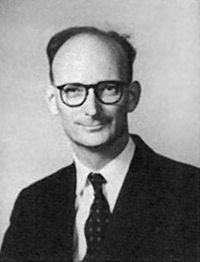You're reading this to get a better understanding of performance utterance and Hamlet right? Well even if you aren't you are now. So settle in and relax.
Hamlet is a old-school Shakespearen play while Performance Utterance is a paper written by Fredrik DeBoer in modern times. What could these two random pieces of literature have to do with one another? Well, DeBoer brings a new perspective to the style Shakespeare uses in Hamlet by comparing it with the ideas of Austin's theory of performativity and Harold Bloom's ideas of "self-overhearing".

This is J.L. Austin, the creator of the theory of performativity which was so perfectly stated by DeBoer is ,"certain language does not merely describe action but acts in being spoken." He then splits it up into three parts: Locutionary, illocutionary, and prelocutionary. An example of Locutionary in Hamlet is when he is giving a soliloquoy to the audience, it's the ability to get an emotion across through language which is exactly what Hamlet does in all of his speeches. Take for instance to be or not to be, do you not feel a huge sense of suicidal thoughts afterwards? I did. An Illocutionary example is basically when King Claudius orders around Rosencratz and Guildenstern to do his dirty work or when Hamlet tells Ophelia they can never be. Its a statement said between characters that forces them to act upon in later scenes. Preloctuionary is what happens after the illocutionary language appears, when ophelia commits suicide when Rosencrats and Guildenstern bombard Hamlet with questions to try and relay info back to King Claudius.

"Harold Bloom argues that Shakespeare's characters frequently develop through "self-overhearing."Shakespeare's characters, in this argument, overhear themselves speaking and in doing so gain self-knowledge." This quote said by DeBoer directly relates how Bloom's theory serves purpose in Hamlet. An example of this is when Hamlet is upset after the actor gives a speech at the end of Act 2. Hamlet gathers from this information that he is not passionate enough about life and after hearing himself talk it through he makes plans to take action against his Uncle.
These two relate in this quote said by DeBoer, "If Hamlet is a character who engages in this self-overhearing, and he is a man who, for most of the play, demonstrates a disconnect between what he says and what he does, it then becomes useful to consider the impact of his performative language on his overhearing self." Which basically states the thesis for DeBoer's entire paper. Which goes on to try and relate the two theories to each other and give himself a better understanding of the purpose of Hamlet.
No comments:
Post a Comment